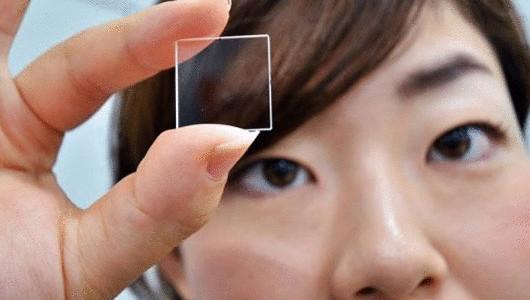491
Memory on a shard of quartz glass
Hitachi has introduced a revolutionary way of storing digital information on quartz glass splinters, which can almost forever without modifications to endure extreme temperatures and hostile conditions. In addition, such technology, even if it sounds challenging, will never require any change. This is especially nice for music lovers who recorded their music collection on CDs and soon discovered that all have to be rewritten in MP3.

New technology company "Hitachi" stores information in the binary system by creating dots inside a thin layer of quartz glass, which can be read with an ordinary optical microscope. If you have a computer that can recognize a binary code (a simple task for a computer regardless of how technologically advanced will be the electronic brain), the data will always be available for reading.
The prototype storage device is made from a square piece of quartz glass with a side length of two centimeters and two millimeters thick. The material of the chip, highly resistant and durable because it is made of beakers and other laboratory instruments.
The chip is resistant to many chemicals and radio waves, can be directly exposed to high temperature flames and heat up to 1 thousand degrees Celsius for a minimum of two hours without risk of damage. It is also waterproof, which means that the device will be able to transfer natural catastrophes such as fires and tsunami. Scientists believe that the data is stored until it is solid glass will not be broken.
At this time, the material has four layers of dots which can hold 40 megabytes per square inch. This is approximately the density of musical laser disc, the researchers note, and say that adding layers is not a problem.
The company "Hitachi" has not decided in which areas to start practical use of the device. But scientists believe that it is necessary to begin with storage of information for government agencies, museums and religious organizations.
Source: /users/104

New technology company "Hitachi" stores information in the binary system by creating dots inside a thin layer of quartz glass, which can be read with an ordinary optical microscope. If you have a computer that can recognize a binary code (a simple task for a computer regardless of how technologically advanced will be the electronic brain), the data will always be available for reading.
The prototype storage device is made from a square piece of quartz glass with a side length of two centimeters and two millimeters thick. The material of the chip, highly resistant and durable because it is made of beakers and other laboratory instruments.
The chip is resistant to many chemicals and radio waves, can be directly exposed to high temperature flames and heat up to 1 thousand degrees Celsius for a minimum of two hours without risk of damage. It is also waterproof, which means that the device will be able to transfer natural catastrophes such as fires and tsunami. Scientists believe that the data is stored until it is solid glass will not be broken.
At this time, the material has four layers of dots which can hold 40 megabytes per square inch. This is approximately the density of musical laser disc, the researchers note, and say that adding layers is not a problem.
The company "Hitachi" has not decided in which areas to start practical use of the device. But scientists believe that it is necessary to begin with storage of information for government agencies, museums and religious organizations.
Source: /users/104






















